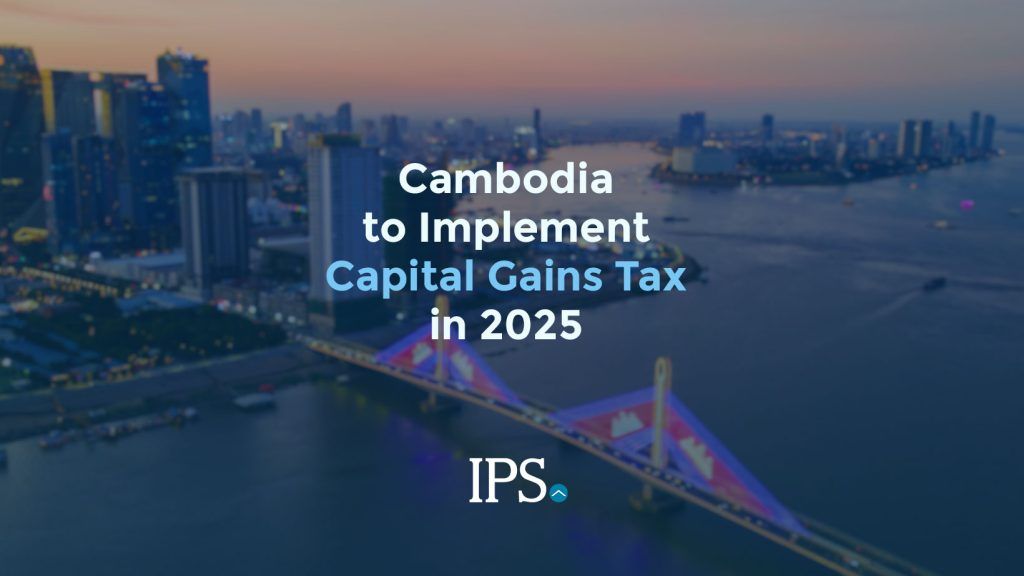What Cambodia’s New Capital Gains Tax Means for Property Owners and Investors
After years of postponements, Cambodia’s Capital Gains Tax (CGT) will officially take effect from 1 September 2025. This is a landmark reform in the Kingdom’s tax system, impacting property owners, investors, and businesses alike.

The Ministry of Economy and Finance confirmed the rollout through Prakas No. 496 MEF.PRK, issued on 18 July 2025. Here’s what the updated framework means for you.
What is Capital Gains Tax?
Capital Gains Tax is a flat 20% levy on profits earned from selling or transferring capital assets.
- The tax base = selling price – allowable expenses
- Applies to both individuals and legal entities when they realize a gain
When Does CGT Apply?
- From 1 September 2025:
CGT applies to capital gains from:- Leases and subleases
- Investment assets (shares, bonds, securities)
- Business goodwill (brands, reputation, customer lists)
- Intellectual property (patents, trademarks, copyrights)
- Foreign currency transactions
- From 1 January 2026:
CGT will also cover immovable property (real estate) sales and transfers.
How is CGT Calculated?
- General rule: 20% of net capital gain
- Immovable property (from 2026):
- Lump-sum method: automatic 80% deduction of sale price
- Actual cost method: deduct acquisition price, improvements, and official fees
- Other assets (from Sept 2025): only the actual cost method is allowed.
If no profit is made, no CGT is payable.
DEEP DIVE: How Does the Capital Gains Tax in Cambodia work?
Residency & CGT Scope: Understanding Who Pays What
Cambodia’s Capital Gains Tax doesn’t treat everyone the same. The law makes a clear distinction between resident taxpayers and non-resident taxpayers, and this determines where your gains are taxed.
- Residents are taxed on their worldwide gains (profits from assets both inside and outside Cambodia).
- Non-residents are taxed only on gains from Cambodian assets.
What does “taxed on worldwide gains” mean?
For residents, it means that if you earn a profit from selling assets abroad, such as property, shares, or investments in another country, the 20% CGT still applies. However, if you already paid capital gains tax overseas, Cambodia allows a credit so you don’t end up paying twice.
For non-residents, the scope is narrower. They only pay CGT on sales of Cambodian assets, such as real estate or investments located in Cambodia.
Example:
- A Cambodian resident sells shares in Singapore → taxable in Cambodia, but any tax already paid in Singapore can be credited.
- A non-resident sells a Phnom Penh condo → taxable in Cambodia.
- A non-resident sells property in their home country → not taxable in Cambodia.
Exemptions
CGT does not apply to:
- Sale of a primary residence held for at least 5 years
- Agricultural land actively used for cultivation (with approval)
- Transfers via inheritance or first-time family donation
- Properties owned by the state, diplomatic missions, or for public interest
- New share issuances used for capital increases
Compliance & Deadlines
- CGT must be declared and paid within three (3) months of realizing a capital gain.
- Transfer Validity: Failure to pay CGT may render the asset transfer legally invalid.
Why Real Estate is Delayed Until 2026
The government postponed real estate inclusion until 1 January 2026 to give property owners and businesses more time to prepare, organize documentation, and adjust financial planning before the new rules apply.
READ MORE: Cambodian Property Tax Guide
Frequently Asked Questions (FAQ)
From 1 September 2025 for leases, securities, goodwill, IP, and foreign currency; from 1 January 2026 for real estate.
A flat 20% of net capital gains.
From 1 September 2025 for leases, securities, goodwill, IP, and foreign currency; from 1 January 2026 for real estate.
If it’s your primary residence and you’ve lived there for 5+ years, it’s exempt.
No. CGT applies on profits, while transfer tax (4%) applies when transferring ownership.
Proof of acquisition cost, receipts for improvements, and transfer fee records.
Your asset transfer (such as property, shares, or leases) may not be legally recognized, and you could face penalties.
CGT must be declared and paid within three (3) months of realizing a capital gain.
It adds transparency and aligns Cambodia with international standards, while encouraging sellers to maintain stronger documentation.
By requiring proper documentation and applying a clear, consistent tax, CGT reduces under-reporting and brings Cambodia in line with global standards. For investors, this predictability builds confidence, while stronger data and fairer practices support a more stable property market in long term.
How Does Cambodia’s 20% CGT Compare Regionally?
At a flat 20%, Cambodia’s Capital Gains Tax looks higher than what some neighboring countries impose:
-
Vietnam: 0.1% on the gross sale price of real estate for individuals
-
Philippines: 6% final tax on real property
-
Thailand: Gains often taxed as income (progressive 5%–35%), but no general CGT
-
Malaysia & Singapore: No general capital gains tax (though Malaysia applies Real Property Gains Tax on certain disposals)
On the surface, this might make Cambodia seem less competitive for investors who compare tax rates alone.
Why Cambodia Still Stands Out
- Simplicity & Predictability: A flat 20% rate is straightforward. No complicated brackets, hidden fees, or unclear rules.
- Lump-Sum Deduction for Real Estate: From 2026, sellers of immovable property can apply an 80% lump-sum deduction. This means only 20% of the selling price is considered “taxable gain.” With CGT at 20%, the effective tax is just 4% of the sale price.
Example: Selling a condo for $100,000 → taxable gain = $20,000 → CGT = $4,000 → effective rate = 4%. - Market Growth Potential: Cambodia remains one of Southeast Asia’s fastest-growing real estate markets, with strong rental yields and lower entry prices compared to regional peers.
- Transparency for Investors: The new tax system aligns Cambodia with international norms, boosting credibility and making the market safer and more attractive for long-term investors.
How IPS Can Help
The introduction of Capital Gains Tax is a milestone reform in Cambodia’s financial landscape. While the rules may feel complex, the phased rollout gives individuals and businesses time to prepare before real estate is included in 2026.
At IPS, we help clients navigate these changes. Whether you’re selling, buying, or planning your next move.
👉 Got questions about Capital Gains Tax and how it affects your property? Contact IPS Cambodia today!

